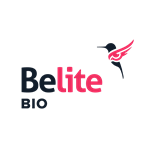-
Belite Bio Announces Presentations at the American Academy of Ophthalmology 2024 Annual Meeting
来源: Nasdaq GlobeNewswire / 14 10月 2024 08:00:00 America/New_York
SAN DIEGO, Oct. 14, 2024 (GLOBE NEWSWIRE) -- Belite Bio, Inc (NASDAQ: BLTE) (“Belite” or the “Company”), a clinical-stage biopharmaceutical drug development company focused on advancing novel therapeutics targeting degenerative retinal diseases that have significant unmet medical needs, today announced that the Company will present data from its completed Phase II adolescent Stargardt disease trial at the American Academy of Ophthalmology Annual Meeting (AAO 2024) being held October 18-21, 2024, in Chicago, IL.
Podium Presentation:
Title: Tinlarebant (LBS-008) for Adolescents with Stargardt Disease
Presentation Type: Late breaking developments (live broadcast)
Presenting Author: Quan Dong Nguyen, MD, MSc
Session: RET16
Date/Time: Saturday, October 19, 2024; 10:33 AM – 10:40 AM CDT
Location: Arie Crown Theater (Lakeside Center building, 1F), Chicago, ILE-poster Presentation
Title: Investigation of an Oral Retinol Binding Protein 4 Antagonist in the Treatment of Childhood-onset Stargardt Disease
Presenting Author: Nathan L Mata, PHD
Date/Time: On-demandAbout Tinlarebant (a/k/a LBS-008)
Tinlarebant is a novel oral therapy that is intended to reduce the accumulation of vitamin A-based toxins (known as bisretinoids) that cause retinal disease in Stargardt Disease type 1 (STGD1) and also contribute to disease progression in geographic atrophy, or advanced dry age-related macular degeneration (AMD). Bisretinoids are by-products of the visual cycle, which is dependent on the supply of vitamin A (retinol) to the eye. Tinlarebant works by reducing and maintaining levels of serum retinol binding protein 4 (RBP4), the sole carrier protein for retinol transport from the liver to the eye. By modulating the amount of retinol entering the eye, Tinlarebant reduces the formation of bisretinoids. Tinlarebant has been granted Fast Track Designation and Rare Pediatric Disease designation in the U.S., Orphan Drug Designation in the U.S. Europe, and Japan, and Sakigake Designation in Japan for the treatment of STGD1.
Stargardt Disease (STGD1)
STGD1 is the most common inherited macular dystrophy (causing blurring or loss of central vision) in both adults and children. The disease is caused by mutations in a retina-specific gene (ABCA4), which results in progressive accumulation of bisretinoids leading to retinal cell death and progressive loss of central vision. The fluorescent properties of bisretinoids and the development of retinal imaging systems have helped ophthalmologists identify and monitor disease progression. Currently, there are no FDA approved treatments for STGD1.
Importantly, the appearance of bisretinoids, followed by retinal cell death, and progressive loss of vision is also observed in geographic atrophy (GA) patients. Therefore, Belite Bio is evaluating safety and efficacy of Tinlarebant in GA patients in a 2-year Phase 3 study (PHOENIX).
About Belite Bio
Belite Bio is a clinical-stage biopharmaceutical drug development company focused on advancing novel therapeutics targeting degenerative retinal diseases that have significant unmet medical needs, such as Stargardt Disease type 1 (STGD1) and Geographic Atrophy (GA) in advanced dry age-related macular degeneration (AMD), in addition to specific metabolic diseases. Safety and efficacy of Belite’s lead candidate, Tinlarebant, an oral therapy intended to reduce the accumulation of vitamin A-based toxins in the eye, is currently being evaluated in three late-stage clinical trials. In STGD1, a 2-year, Phase 3 study (DRAGON) and a 2-year, Phase 2/3 study (DRAGON II) in adolescent STGD1 subjects are currently ongoing. In GA, a 2-year, Phase 3 study (PHOENIX) is ongoing. For more information, follow us on Twitter, Instagram, LinkedIn, Facebook or visit us at www.belitebio.com.
Forward Looking Statements
This press release contains forward-looking statements about future expectations and plans, as well as other statements regarding matters that are not historical facts. These statements include but are not limited to statements regarding the potential implications of clinical data for patients, and Belite Bio’s advancement of, and anticipated preclinical activities, clinical development, regulatory milestones, and commercialization of its product candidates, and any other statements containing the words “expect”, “hope” and similar expressions. Actual results may differ materially from those indicated in the forward-looking statements as a result of various important factors, including but not limited to Belite Bio’s ability to demonstrate the safety and efficacy of its drug candidates; the clinical results for its drug candidates, which may not support further development or regulatory approval; the timing to complete relevant clinical trials and/or to receive the interim/final data of such clinical trials; the content and timing of decisions made by the relevant regulatory authorities regarding regulatory approval of Belite Bio’s drug candidates; the potential efficacy of Tinlarebant, as well as those risks more fully discussed in the “Risk Factors” section in Belite Bio’s filings with the U.S. Securities and Exchange Commission. All forward-looking statements are based on information currently available to Belite Bio, and Belite Bio undertakes no obligation to publicly update or revise any forward-looking statements, whether as a result of new information, future events or otherwise, except as may be required by law.
Media and Investor Relations Contact:
Jennifer Wu / ir@belitebio.com
Julie Fallon / belite@argotpartners.com

